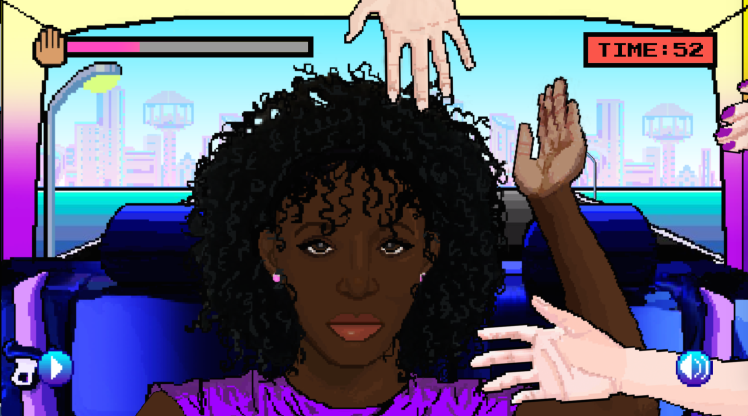The most important thing about Hair Nah is the slap. It’s loud and visceral, almost goofy in how violent it sounds. It’s comedic and cathartic. The game encapsulates something that black women experience constantly: invasions of their privacy and space as people insist on touching their hair. It’s the debut game by designer Momo Pixel — yes, that’s her real name and yes, it’s awesome — and it’s available to play for free on the web. She’s also currently working on an app version.
“I’d say I view it as a therapeutic game more than as a teachable game,” said Pixel in a phone call with GamesBeat. “I made it to be more for black women. I wanted them to be able to play this game and have fun, and also use it as a type of therapy. I don’t think we really get opportunities of joy. We don’t have many video games with that kind of protagonist.”
You play as Aeva, a black woman who just wants to travel in peace. At the start you customize your avatar, choosing from six different skin tones and various hair styles. You select whether you’re heading to Osaka, Havana, or Santa Monica.
And then it’s time to get slapping.
June 5th: The AI Audit in NYC
Join us next week in NYC to engage with top executive leaders, delving into strategies for auditing AI models to ensure fairness, optimal performance, and ethical compliance across diverse organizations. Secure your attendance for this exclusive invite-only event.
You’re bombarded with hands reaching for your hair, cooing things like, “Ooh, it’s so fluffy!” and exclaiming, “Is it really attached to your head?!” It’s horrifying and absurd to endure the assault of all these people, advancing on you like a horde of mindless hair-craving zombies. And it’s empowering and hilarious to slap them away like they’re nothing more than a nuisance. The gameplay is accessible, just the right and left arrow keys, and you have 60 seconds to fill a meter labeled as “Nah.”
“With this game, comedy became automatic,” said Pixel. “Also, I just wanted people to be able to laugh at it. When people touch your hair, it’s not funny. You often don’t get to do anything about it. In the game, I thought, man, I want this game to be everything that the reality is not. We’re going to make it fun.”
And to make it fun, everything comes back to the slap.
“The slap was the most important thing to me. You have to feel so successful, just fulfilled when you get that smack sound. It’s just funny,” Pixel said with a laugh. “Once we put that sound in, it just made the game.”
Though Pixel didn’t necessarily make the game to educate folks on this topic, playing Hair Nah can actually show people how inappropriate it is to touch black women’s hair without their permission. She says that interacting with something is a natural way for people to learn, even from a young age.
“You kind of learn by playing that this is not okay, you know what I mean?” said Pixel. “I didn’t even have to think about making this game teachable, because just by playing it, just by what it is, you can already see that this is not okay.”
Pixel is an art director and designer at the ad agency Wieden+Kennedy in Portland, and she says she’s always wanted to make a game. Hair Nah is full of her personality: colorful, bold, and very funny despite — or perhaps because of — the subject matter. Before Pixel started her career as a designer, she wanted to be a comedian.
“Comedy is always based in honesty,” said Pixel. “A lot of the best comedians have really dark stories. If you look at Robin Williams, he was one of my idols, but he was also very sad. He had a sad story. But look at how many people he made laugh.”
She applied that philosophy to Hair Nah. It’s a painful subject, and all the soundbites that the people say in the game are actual things that people say in real life. When Pixel released the game, she received an outpouring of support online. As she intended, the game was therapeutic.
“The responses have been crazy, actually,” said Pixel. “I’ve gotten a mix. You’ll get some people in my inbox who are like, I had no idea this was even an issue, what? Or people being like, girl, you don’t know how much I needed this game.”


